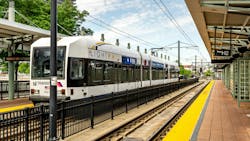NJ Transit issues RFP for Hudson-Bergen Light Rail extension draft environmental impact statement
New Jersey Transit (NJ Transit) has furthered progress on the extension of the Hudson-Bergen Light Rail into Bergen County, N.J., with the issuing of a request for proposals (RFP) to hire a contractor to create the draft environmental impact statement (DEIS). The proposed 10-mile extension would provide light-rail service from the current terminus at Tonnelle Ave. in North Bergen up to a currently anticipated terminal at Englewood Hospital.
“NJ Transit remains committed to extending the Hudson-Bergen Light Rail into Bergen County,” said NJ Transit President and CEO Kris Kolluri. “This RFP is a concrete demonstration of that commitment. Providing mass transit options to all regions of New Jersey takes cars off the road, cleans the air we breathe and drives economic activity, sustainable housing and a multitude of other benefits.”
Bergen County Executive James Tedesco added, “As one of the most densely populated counties in the state, Bergen County welcomes additional mass transit options. The Northern Branch project will fulfill that need and enhance the lives of all who call Bergen County home. I thank NJ Transit for continuing this vital project.”
The Northern Branch project, as currently proposed, would extend the Hudson-Bergen Light Rail system by 10 miles. The extension would include seven new station stops in five municipalities. The electric light-rail service would operate on West Side Avenue in North Bergen, then on existing railroad right-of-way owned by CSX Transportation (CSX) between 91st Street in North Bergen and the northern border of Englewood and would introduce new station stops in North Bergen, Ridgefield, Palisades Park, Leonia and Englewood.
The Federal Transit Administration (FTA) rescinded its notice of intent (NOI) to consider NJ Transit’s previously submitted environmental impact statement in 2023, citing changes in environmental conditions, including flood plains, storm water management and air quality which have occurred since 2007. NJ Transit says it’s determined that the scope of work required to update the environmental impact statement would require a new contract. At that time, work began to assess and prepare the requirements included in the current RFP.
